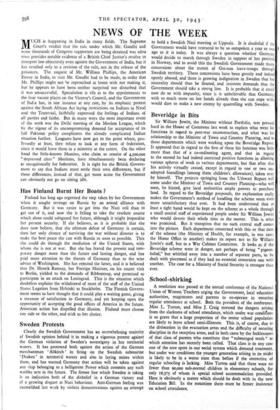Beveridge in Bits
Sir William Jowitt, the Minister without Portfolio, was pressed hard in the House of Commons last week to explain what were his functions in regard to post-war reconstruction, and what was his relationship to The Minister of Town and Country Planning, and to those departments which were working upon the Beveridge Report. It appeared that in regard to the first of these his function was little more than that of a co-ordinating agent, and that in regard to the second he had indeed exercised positive functions in allotting various spheres of work to various departments, but that after that his activity virtually ceased, except in regard to one or two un- adopted foundlings (among them children's allowances), taken over by himself. The projects springing from the Uthwatt Report will come under the Minister of Town and Country Planning—who will soon, he hinted, give local authorities ample powers to purchase land. In regard to the Beveridge proposals, the explanation really makes the Government's method of handling the scheme seem even more unsatisfactory than ever. It had been understood that at least a tight hand would be kept on the scheme as a whole through a small central staff of experienced people under Sir William Jowitt who would devote their whole time to the matter. This is what was promised. But it transpires that no such central staff comes into the picture. Each department concerned with this or that item of the scheme (the Ministry of Health, for example, in one case, the Home Office in another) makes its report not to Sir William Jowitt's staff, but to a War Cabinet Committee. It looks as if the Beveridge scheme were in danger, not perhaps of being " pigeon- holed," but whittled away into a number of separate parts, to be dealt with piecemeal as if they had no essential connexion one with another. The case for a Ministry of Social Security is stronger than ever.






















 Previous page
Previous page